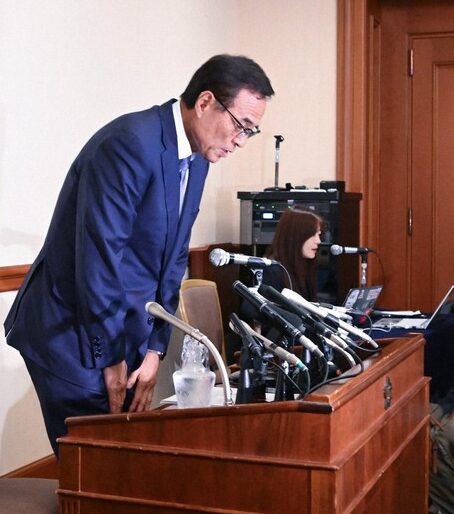For a decade, Takeshi Niinami has been one of the most visible faces of corporate Japan. He spoke fluently about reform and globalization, courted investors from New York to London, and turned up at policy tables in Tokyo where the future of the economy gets drawn. That is why his sudden resignation from Suntory landed like a thunderclap. Police searched his Tokyo residence as part of an investigation into a health supplement suspected of containing THC, which is illegal in Japan. He says he believed the product was a CBD supplement that would be legal. The board accepted his resignation to protect the company regardless of where the investigation leads. The result is more than a leadership change. It is a test case for governance, reputation, and how Japanese law now treats border crossing wellness products.
What we know so far
Authorities in Fukuoka Prefecture initiated the probe in late summer. On August twenty two, officers searched Niinami’s home in Tokyo and questioned him about a supplement under suspicion for THC content. Media accounts say a urine sample was taken and that no illegal substance was detected, yet the legal question is not consumption but whether the product itself violated strict rules that ban THC. After internal discussions that did not include the executive in question, Suntory’s board concluded that stepping down was necessary to prevent further harm to the brand. The company filed a formal notice confirming that Niinami resigned effective September one, with the title listed as representative director, chairman, and chief executive officer.
Niinami gave a public explanation the next day. He said he had acted under the belief that the product was a lawful CBD supplement and that he never actually received the shipment. He apologized for the trouble caused, especially since Suntory itself manufactures and sells supplements, and said the decision to resign was meant to allow the company to move forward. He also paused his public activities at Keizai Doyukai, the influential business association where he serves as chair, while maintaining that he is innocent of any wrongdoing.
Why this case is a governance stress test
Multinational consumer groups live on trust. When your brands sit on a family dinner table or a hotel bar cart, the consumer assumes the people at the top understand safety, legality, and the optics of both. That is why this episode resonates beyond a single package and a single investigation. Even if a court never files charges, the perception of poor judgment by a chief executive can expose a company to reputational risk that lasts longer than a single news cycle. Suntory’s board reacted with speed. The move communicates that the brand comes before any one leader and that independence exists at the top of the Japanese corporate pyramid.
There is another layer. Suntory is not only a whisky icon. It is a diversified food and beverage group with global stakes, including the acquisition that created Beam Suntory and put names like Jim Beam in the same portfolio as Yamazaki. That means supply chains, marketing claims, and regulatory risk run across borders. A question about one executive’s personal supplement order becomes a question about how the group as a whole treats ingredients, vendor vetting, and staff education in a world where a product considered routine in one country can be illegal in another.
The legal line between CBD and THC in Japan
For years, Japan has maintained some of the strictest cannabis related laws in the industrial world. Revisions have begun to modernize the framework, but the basic rule still draws a clear line. THC is banned. CBD may be sold if it is made from authorized parts of the plant and contains no THC. Lawmakers revised the Cannabis Control Act in twenty twenty three and rolled out implementing measures in twenty twenty four and twenty twenty five. The changes opened a path for cannabis derived pharmaceuticals and set defined limits for THC content in CBD goods. At the same time, regulators emphasized that those limits remain extremely strict. Importers and retailers now have a duty to prove compliance through documentation and testing, and individuals who import supplements on their own can still run afoul of the rules if any THC is present.
That is the context for this case. If the product contained THC above trace limits, it would be illegal regardless of any benign intent by the buyer. If it was a compliant CBD product with no THC, there is no crime to allege. This is why the investigation focuses on what was purchased and shipped, not on whether the buyer used cannabis.
What this means for Japanese boards
The swift acceptance of a high profile resignation signals a cultural turn that has been building for years. Japan’s corporate governance code and stewardship code pushed boards to become more independent, more responsive to risk, and more willing to make decisions that defend long term value. In practice, that means directors will now move when the cost of inaction threatens trust. Expect a cascade of quiet boardroom reviews across the country that will ask simple questions with large consequences.
Do we have a strong compliance program around supplements and wellness products if we make or market them. Do senior leaders receive explicit training on cross border rules for ingredients. Do we have an escalation route that bypasses normal chains of command when a reputational event involves the most senior people in the building. Would we act as quickly if the person at the center of the storm was our top seller, our star inventor, or a member of the founding family. These are not hypothetical questions anymore.
The investor lens
Investors will sort the signal from the noise. On the one hand, the company removed a risk and demonstrated that directors can act. On the other, the departure of a seasoned leader always creates execution risk. Niinami was an effective international salesman for the group, and he carried credibility in policy circles. The near term questions are practical. Who stabilizes external relationships. Who fields questions from regulators abroad about quality and labeling in wellness categories. What does the transition plan look like at the operating company level, where brands must continue to ship and sell without interruption.
At the portfolio level, the bigger picture remains intact. Spirits brands with global demand have momentum. Non alcoholic beverages face cost and pricing dynamics that every producer must manage. Health products will continue to grow as a category, but the compliance bar just rose another notch. If management demonstrates a steady hand and communicates clearly, the long term investment story will focus on fundamentals again rather than controversy.
Lessons for any company that sells or imports supplements
First, assume that rules in Japan will be tighter than rules in common export markets. Products labeled CBD in the United States or Europe may include detectable THC that is permissible there but illegal here. Second, require certificates of analysis from accredited labs and do not rely on verbal assurances from vendors or friends. Third, build a red flag list of cannabinoids and other borderline ingredients that trigger automatic legal review. Fourth, train senior leaders specifically on personal purchases and gifts. Executive behavior does not happen in a vacuum. People watch what leaders do and copy it.
Finally, create a crisis protocol that starts the clock the moment a search, subpoena, or media inquiry arrives. Identify who convenes the board. Identify who speaks to regulators. Identify who speaks to employees and customers. Run tabletop exercises so that when a real event occurs, you are running a plan rather than improvising.
What we still do not know
We do not yet know the final legal disposition of the supplement at the center of this case. We do not know whether prosecutors will bring any charges or whether the investigation will conclude with no action. We do not know the final impact on business relationships that Niinami personally cultivated, although the brand power of Suntory products gives the group a cushion. What we do know is that the company has opted to separate the future of the brand from the outcome of a personal matter. That is the essence of modern governance.
The human side of a public fall
There is a temptation to treat corporate drama as sport. It should not be. Resignations carry a human cost for families and for employees who admired a leader’s achievements. Japan has a tradition of accountability that sometimes turns harsh. The more constructive response is to learn quickly, to protect the people who did nothing wrong, and to tighten the systems that allow an organization to spot and solve problems before they land in the headlines. If this incident accelerates that kind of maturity across corporate Japan, the shock will have served a purpose.
What to watch next
Watch for confirmation of who takes point on international outreach and investor communication. Watch for board level updates on compliance reforms in the supplements business and any new internal controls for executive conduct. Watch for how regulators clarify testing standards and documentation for imported CBD products. Also watch Keizai Doyukai and other forums where Niinami has played a visible role. If he remains on pause, new voices will fill the space and push their own visions of how Japan should compete in the world.
Suntory built its identity over more than a century through craftsmanship, marketing genius, and a global appetite for Japanese whisky. A single controversy will not erase that. Yet the group now stands as an example of how trust can be strained by even the perception of legal risk around a product that crosses borders. In a tighter regulatory climate, brand leaders will need a blend of curiosity, humility, and discipline. Ask before you buy. Verify before you endorse. Act before a problem grows. That is how reputations survive the hard days.

